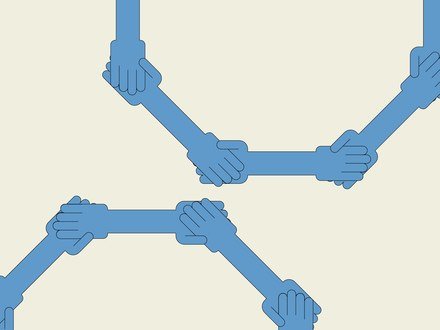Blockchain's Brand New World Is Being Built By Refugees
How Refugees Are Helping Create Blockchain's Brand New World

Without legal proof of your existence, you can’t do many things. You can’t vote, and you can’t drive. You can’t start a bank account, or access government services. Good luck getting into a bar.
According to the World Bank, more than a billion people have no way to prove their identity. The un-verified include refugees, trafficked children, the homeless, and other people who slip through society without developing many institutional affiliations. The problem feeds on itself: the longer a person goes without associations, the harder it is provide enough of a record to create them. But as bitcoin’s popularity swells, a small group of cryptocurrency enthusiasts and social entrepreneurs is trying to put the cryptographic ledger that underpins the novel currency to work in service of the vulnerable. They see promise in using blockchain technology to create an immutable record, one that has the added side effect of making financial transactions cheaper and more efficient.
Though best known for underpinning volatile cryptocurrencies, like Bitcoin and Ethereum, blockchain technology has a number of qualities which make it appealing for record-keeping. A distributed ledger doesn’t depend on a central authority to verify its existence, or to facilitate transactions within it, which makes it less vulnerable to tampering. By using applications that are built on the ‘chain, individuals may be able to build up records over time, use those records across borders as a form of identity—essentially creating the trust they need to interact with the world, without depending on a centralized authority, like a government or a bank, to vouch for them.
For now, these efforts are small experiments. In Finland, the Finnish Immigration Service offers refugees a prepaid Mastercard developed by the Helsinki-based startup MONI that also links to a digital identity, composed of the record of one’s financial transactions, which is stored on the blockchain. In Moldova, the government is working with digital identification experts from the United Nations Office for Project Services (UNOPS) to brainstorm ways to use blockchain to provide children living in rural areas with a digital identity, so it’s more difficult for traffickers to smuggle them across borders.
Among the more robust programs is a pilot the United Nations World Food Program (WFP) launched in Jordan last May. Syrian refugees stationed at the Azraq Refugee Camp receive vouchers to shop at the local grocery store. The WFP integrated blockchain into its biometric authentication technology, so Syrian refugees can cash in their vouchers at the supermarket by staring into a retina scanner. These transactions are recorded on a private Ethereum-based blockchain, called Building Blocks. Because the blockchain eliminates the need for WFP to pay banks to facilitate transactions, Building Blocks could save the WFP as much as $150,000 each month in bank fees in Jordan alone. The program has been so successful that by the end of the year, the WFP plans to expand the technology throughout Jordan. Blockchain enthusiasts imagine a future in which refugees can access more than just food vouchers, accumulating a transaction history that could stand in as a credit history when they attempt to resettle.
ID2020, an alliance of large companies like Accenture and Microsoft, with UN agencies, nongovermental organizations and governments, is developing technology that helps undocumented people secure elements of identity, from children’s vaccination cards to voter registration. While most of these systems are enabled by existing technology, like the internet, recently the group has started to review blockchain-based opportunities. In an upcoming pilot program, the alliance will incorporate blockchain into a biometric system used by the United Nations refugee agency, UNHCR, to facilitate transactions like cash transfers, shelter or food.
In addition to helping the aid group save on bank fees and making sure that aid goes directly to refugees, a blockchain-based system can help refugees build a more permanent identity. Right now, when refugees enter a camp run by UNHCR, they’re issued documentation, but there’s no way to extend your UNHCR identity once you leave. But by recording these transactions on the blockchain, which keeps an indelible record, there’s the possibility the system could function as identification in a new country.
This approach is finding backers beyond those who work with refugees. A New York City startup called Blockchain for Good has developed an Android app called Fummi that allows homeless people to access food pantries and shelters, tap into financial services, and generally manage their digital identities. In December, the startup teamed with a group that relies on federal subsidies to provide smartphones to low-income people to distribute mobile phones to 3,000 homeless people, starting in the Bronx. The app shows when people have checked into shelters, or how much they have paid for showers or haircuts.
As technology is deployed, there’s a risk that it will alter services in ways that will harm the world's most vulnerable populations
The app has a digital wallet for dollars, and also a cryptocurrency created for the project. To start, the currency can be redeemed for talk-time and data. But the goal is to help people connect to services more regularly and efficiently, while bringing down the cost of the services. Because those without homes tend to move around regularly, many re-apply for a federal program like food stamps in a new place every few months at great administrative cost. Because their transactions, which compose their identity, are permanently stored on the blockchain, the startup hopes federal program can tap into the permanent transaction recorded on the blockchain to reduce the sign-up costs.
But as technology is deployed rapidly in service of the world’s most vulnerable populations, there’s a risk that it will alter services in ways that will harm the people it’s set up to help. In the earliest days of the web, which turned 29 earlier this week, its proponents believed that they held the potential to make the world a more free and open place. They didn’t anticipate the degree to which it would consolidate power in the hands of a few corporate and government interests. ID2020 Executive Director Dakota Gruener points out that historically, there’s always been a trade-off between offering access to services and providing privacy and security. “It’s always been a binary,” she says. “People are quite excited that it appears there's now a model in which you could provide people broad access to the services that they need in a privacy-protecting way.” She’s clear, however, that blockchain is not a panacea, and while it may be helpful for certain aspects involved in shoring up a digital identity, ID2020 primarily relies on existing technology.
LEARN MORE
The WIRED Guide to the Blockchain
Blockchain enthusiasts believe that, ultimately, tracking identity on the blockchain will eventually allow people to exercise more control over their personal information. Applications which show only parts of the ledger to people who require verification of aspects of your identity could let us present just the minimum amount of information. Rather than flashing the bartender a license containing your home address, you could present a QR code that provides her permission to check your age. “If you need to show a certain level of [personal details] to your bank, that’s all you need to show them,” says Vanessa Grellet, who is the executive director at the blockchain software technology company ConsenSys. “The change in paradigm is that you own all your information.”
But in the rush to apply blockchain technology to every problem, many point out that relying on the ledger may have unintended consequences. As the Blockchain for Social Impact chief technology officer at ConsenSys, Robert Greenfeld IV writes, blockchain-based identity “isn’t a silver bullet, and if we don’t think about it/build it carefully, malicious actors could still capitalize on it as an element of control.” If companies rely on private blockchains, he warns, there’s a danger that the individual permissions will prevent these identity records from being used in multiple places. (Many of these projects, like the UNWFP project, are built on private blockchains so that organizations can exert more control over their development.) “If we don’t start to collaborate together with populations, we risk ending up with a bunch of siloed solutions,” says Greenfeld.
For his part, Greenfeld suggests governments could easily use state-sponsored machine learning algorithms to monitor public blockchain activity. But as bitcoin enthusiasts branch out of their get-rich-quick schemes to wrestle with how to make the web more equitable for everyone, they have the power to craft a world of their own devising. The early web should be a lesson to the bitcoin enthusiasts as they promote the blockchain’s potential. Right now we have the power to determine its direction; the dangers exist, but the potential is enormous.


My 10 favorite posts:
 Stephen Hawking, a Physicist Transcending Space and Time, Dies at 76
Stephen Hawking, a Physicist Transcending Space and Time, Dies at 76
https://steemit.com/news/@mybestnews/stephen-hawking-a-physicist-transcending-space-and-time-dies-at-76

 SteemIt Daily following report : 24 upvotes for my followers and 18 members followed on Tue Mar 13 2018 ! See details:
SteemIt Daily following report : 24 upvotes for my followers and 18 members followed on Tue Mar 13 2018 ! See details:https://steemit.com/steemit/@mybestnews/steemit-daily-following-report-24-upvotes-for-my-followers-and-18-members-followed-on-tue-mar-13-2018-see-details

 Monkey on Deer Sex...It Happens - Seriously, Science?
Monkey on Deer Sex...It Happens - Seriously, Science?https://steemit.com/sex/@mybestnews/monkey-on-deer-sex-it-happens-seriously-science

 Boob morning! Thanks to my followers and upvoters! My gift:
Boob morning! Thanks to my followers and upvoters! My gift:https://steemit.com/sexy/@mybestnews/2baui7-boob-morning-thanks-to-my-followers-and-upvoters-my-gift

 SteemIt Daily following report : 24 upvotes for my followers and 13 members followed on Tue Mar 13 2018 ! See details:
SteemIt Daily following report : 24 upvotes for my followers and 13 members followed on Tue Mar 13 2018 ! See details:https://steemit.com/steemit/@mybestnews/steemit-daily-following-report-24-upvotes-for-my-followers-and-13-members-followed-on-tue-mar-13-2018-see-details

 Star Wars: Cantina Talk: Is Solo in Even More Trouble?
Star Wars: Cantina Talk: Is Solo in Even More Trouble?https://steemit.com/movies/@mybestnews/star-wars-cantina-talk-is-solo-in-even-more-trouble

 Boob morning! Thanks to my followers and upvoters! My gift:
Boob morning! Thanks to my followers and upvoters! My gift:https://steemit.com/sexy/@mybestnews/boob-morning-thanks-to-my-followers-and-upvoters-my-gift

 SteemIt Daily following report : 36 upvotes for my followers and 65 members followed on Mon Mar 12 2018 ! See details:
SteemIt Daily following report : 36 upvotes for my followers and 65 members followed on Mon Mar 12 2018 ! See details:https://steemit.com/steemit/@mybestnews/steemit-daily-following-report-36-upvotes-for-my-followers-and-65-members-followed-on-mon-mar-12-2018-see-details

 Scientists Are Warning that We May See a "Mini Ice Age" By 2030 As Temperatures Continue to Plummet
Scientists Are Warning that We May See a "Mini Ice Age" By 2030 As Temperatures Continue to Plummethttps://steemit.com/heather/@mybestnews/scientists-are-warning-that-we-may-see-a-mini-ice-age-by-2030-as-temperatures-continue-to-plummet

 Boob morning! Thanks to my followers and upvoters! My gift: Love cosplay!!
Boob morning! Thanks to my followers and upvoters! My gift: Love cosplay!!https://steemit.com/sexy/@mybestnews/boob-morning-thanks-to-my-followers-and-upvoters-my-gift-love-cosplay



